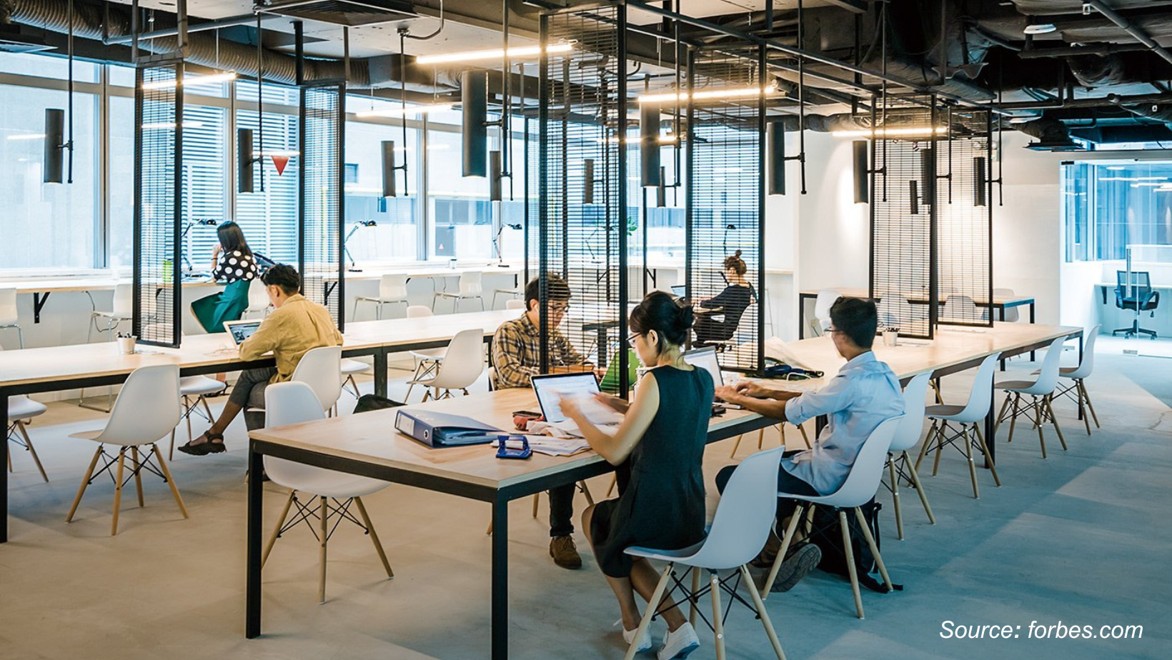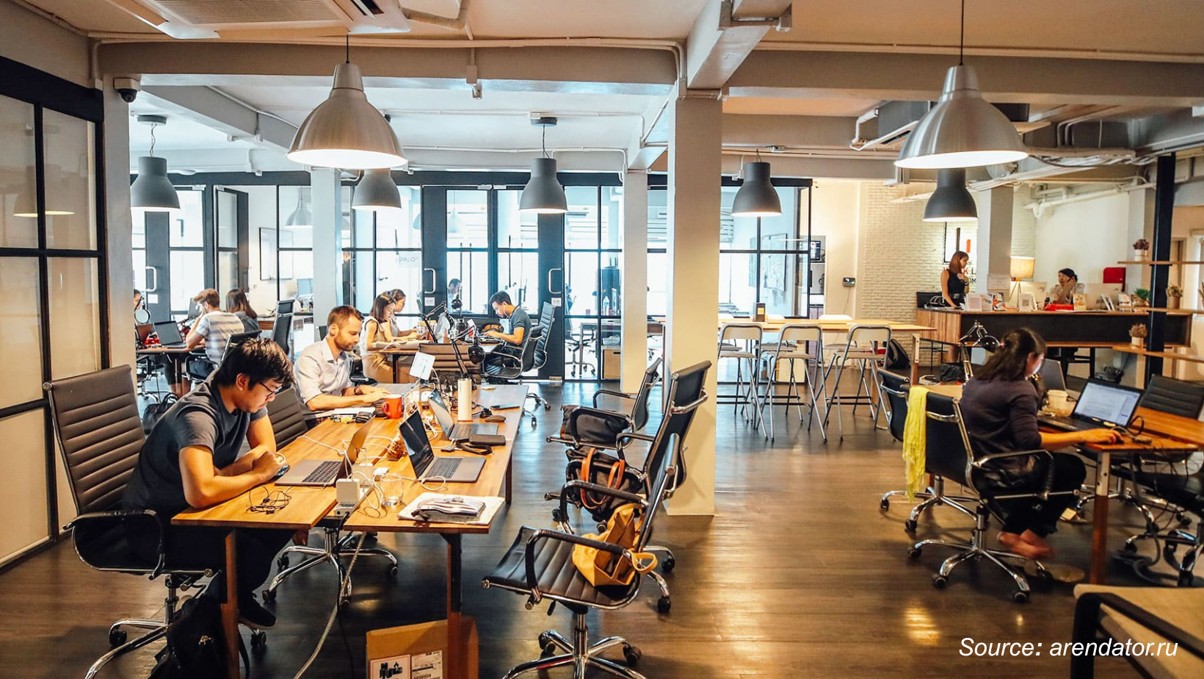Hybrid Work Culture and Urban Transformation Redefining Co-Working Space in France
Published: 2025-09-18

The France co-working space industry is undergoing rapid transformation, propelled by widespread hybrid and remote work adoption, expanding urban centres, and accelerating regional densification. Demand is rising for multifunctional, tech-enabled, and space-efficient workplaces that serve as both collaboration hubs and professional HQs for distributed teams.
Operators and landlords are integrating IoT, AI and ergonomic design, alongside hospitality and wellness features, to optimise occupancy, personalise member experiences and improve productivity. Paired with low-carbon materials and energy-efficient fit-outs to meet regulatory and ESG expectations, these innovations are reshaping how offices are designed, procured and operated across France.
According to Next Move Strategy Consulting, the France Co-Working Space Market was valued at USD 911.7 million in 2024, and is expected to be valued at USD 1178.1 million by the end of 2025. The industry is projected to grow, hitting USD 3158.2 million by 2030, with a CAGR of 21.8% between 2025 and 2030.
Curious about the France Co-Working Space Market? Download FREE Sample Now!
Co-working provides on-demand workplace infrastructure, hot desks, dedicated desks, private suites, meeting and event facilities, and virtual office services, combined with hospitality, community programming and flexible commercial terms. In France, this model has evolved from a startup-centric novelty into a strategic lever for corporate real estate, urban renewal and talent policy.
Two structural forces drive that transition: the mainstreaming of hybrid work, which creates recurring and distributed workplace needs; and urbanisation plus regional densification, which reshapes where those needs are met. Technology is the enabler: booking platforms, telemetry, analytics and enterprise integrations turn space into a measurable, repeatable product, the prerequisite for scaling through management agreements, JVs or franchising.
How Hybrid Work is Powering the Future of France’s Co-Working Market
Hybrid work has transformed corporate real-estate dynamics. INSEE data show telework remained material in 2024, with a meaningful share of private-sector employees teleworking at least occasionally. Rather than a one-time spike, hybrid schedules have become embedded, many teams adopt a cadence, for example, two days remote, three in-office that produces predictable, distributed demand, i.e., team days, onboarding sessions, client meetings and infrequent HQ visits.
Co-working networks are uniquely suited to satisfy these patterns because they provide geographically distributed capacity that can be procured as pooled seat allocations or enterprise passes. Operators that productise these offers, such as, with seat pooling, multi-site booking dashboards, utilisation reporting and corporate billing convert adhoc usage into contracted revenue, reduce churn, and win procurement approvals from HR and real estate teams.
Urbanisation and Regional Densification Fueling France’s Co-Working Boom
Paris remains the single largest market for premium and client-facing functions, but demand is decentralising. Urbanisation concentrates talent and services; simultaneously, rising central rents, congestion, and lifestyle preferences are pushing firms to consider satellite hubs and regional locations.
Colliers’ Flexpansion research documents owner-led repurposing of office stock and a growing flexible inventory across EMEA — a trend mirrored in France as landlords partner with operators to convert underused buildings into hybrid hubs. This reality creates a two-track commercial approach: maintain premium, hospitality-led flagship sites in core city centres to capture enterprise HQ and client needs, while scaling modular, lower-capex commuter nodes in secondary cities (Lyon, Nantes, Toulouse, Montpellier, Strasbourg) that deliver faster payback and superior margin potential.
Why flexible space is now a core real-estate strategy, and how technology is making it scalable
The co-working market in France has moved from fringe experiment to strategic infrastructure for modern work. Co-working today combines hot desks, dedicated seats, private offices, meeting and event facilities, and virtual office services, delivered with hospitality standards, digital booking, and data-driven operations.
Technology is the connective tissue, which means it turns physical real estate into a repeatable product that can be scaled, measured, and monetised. As corporations adopt hybrid policies and cities densify, operators that pair disciplined site strategy with robust tech stacks will capture demand from freelancers, SMEs, and increasingly large enterprises.
Technology is the operating system that converts physical space into a monetizable product. Critical capabilities include enterprise booking and seat-pooling portals, desk and room telemetry (to measure realised occupancy), CRM automation for member lifecycle and upsell, and analytics dashboards that deliver utilisation KPIs to corporate clients.
Travel-to-workspace integrations, for example, Accor integrating Wojo and Worklib with its ALL loyalty platform also add distribution channels by linking business travel with workspace booking. On the physical side, modular fit-outs and repeatable design templates reduce capex per workstation and compress lead times which is essential when scaling through JVs or franchise models.
Strategic Company Actions Driving Market Transformation
Several recent examples crystallise the market direction. Morning Coworking’s 50th Paris-region opening in Boulogne-Billancourt, March 2025 underlines domestic scale and regional densification as operators chase mid-market and corporate clients. IWG’s partnership with asset manager Perial AM to launch multiple Factories repurposes suburban office stock into hybrid hubs, exemplifying landlord-operator collaboration to accelerate supply.
Deskeo’s acquisition and redevelopment of a prime Neuilly address reflects a premium, enterprise-grade play, while WeWork hosting fintech Shares as a French HQ confirms flexible space as a credible headquarters option for scaleups. Together, these cases illustrate densification, landlord collaboration, and enterprise adoption in action.
The Road Ahead for France’s Co-Working Market
France’s co-working market has evolved into a layered ecosystem where hybrid work patterns, urbanisation, and regional densification define long-term growth, while technology acts as the operating backbone. The winners will be those operators who can balance premium flagship sites in dense urban centres with modular, lower-capex hubs across regional and suburban markets. Standardised fit-outs, enterprise-grade tech stacks, and strong landlord partnerships will be critical to scaling profitably.
For investors and stakeholders, the message is clear, France’s co-working story is no longer about freelancers or startups alone, it is about building flexible infrastructure that corporates, scaleups, and even public institutions increasingly depend on. Over the next three to five years, we can expect a sharper enterprise adoption, deeper landlord-operator collaborations, and an intensified focus on sustainability and ESG compliance. Those who align early with these structural shifts will capture the strongest share of value in a market that is becoming central to the future of French work and real estate.
About the Author
 Mayurima Roy is a seasoned researcher with over two years of experience, specializing in various industry verticals such as elevator market, recycling market, and construction electronics. With a strong passion for writing, she views blogging as a valuable platform to share her industry insights and expertise. Outside of tracking market trends and developments, Mayurima enjoys crafting, cooking, and exploring her creativity through photography.
Mayurima Roy is a seasoned researcher with over two years of experience, specializing in various industry verticals such as elevator market, recycling market, and construction electronics. With a strong passion for writing, she views blogging as a valuable platform to share her industry insights and expertise. Outside of tracking market trends and developments, Mayurima enjoys crafting, cooking, and exploring her creativity through photography.
About the Reviewer
 Sikha Haritwal is a researcher with more than 3 years of experience. She has been keeping a close eye on several industry verticals, including Banking, Financial Services, and Insurance (BFSI), personal care products, and consumer electronics. She has avid interest in writing news articles and hopes to use blog as a platform to share her knowledge with others. When she is not following industry updates and trends, she spends her time reading, writing poetry, cooking, and photography.
Sikha Haritwal is a researcher with more than 3 years of experience. She has been keeping a close eye on several industry verticals, including Banking, Financial Services, and Insurance (BFSI), personal care products, and consumer electronics. She has avid interest in writing news articles and hopes to use blog as a platform to share her knowledge with others. When she is not following industry updates and trends, she spends her time reading, writing poetry, cooking, and photography.


















Add Comment